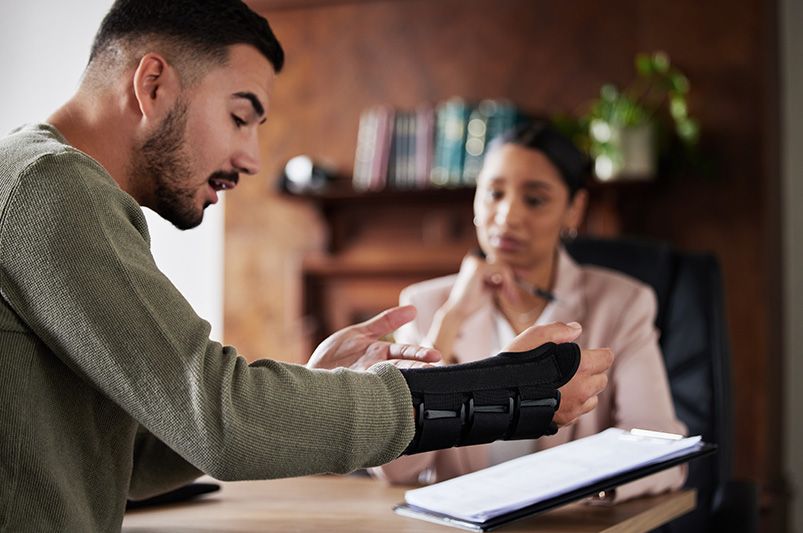Personal Injury in California: When Should You Talk to a Lawyer?
Published: 09/09/2025 | Updated: 09/09/2025
Accidents can happen anywhere—on the road, at work, in a store, or even while walking through your neighborhood. Some injuries are small inconveniences. Others, however, can turn your world upside down—impacting your health, income, and family.
That’s when a big question comes up: Do I need to call a lawyer?
In California, personal injury laws exist to protect people who are hurt because of someone else’s negligence or wrongful actions. But not every accident requires legal representation. This article will walk you through when hiring a lawyer makes sense, what warning signs to watch for, and how to take the right steps if you’ve been injured.
By the end, you’ll have a clear, consumer-friendly roadmap for deciding if it’s time to seek legal help.
What Counts as a Personal Injury Case?
A personal injury case arises when you’re harmed due to someone else’s carelessness, recklessness, or intentional act. It’s not limited to car accidents—California law covers a wide range of situations.
Common personal injury case types include:
-
Car, truck, or motorcycle accidents caused by negligent drivers.
-
Slip and fall accidents in stores, restaurants, or rental properties.
-
Dog bites that result in medical treatment or scarring.
-
Workplace injuries where a third party (not just your employer) may share fault.
-
Defective products that cause burns, shocks, or other harm.
-
Medical malpractice when doctors or hospitals provide negligent care.
The damages in a personal injury case can include:
-
Medical costs (hospital stays, physical therapy, prescriptions).
-
Lost wages if you can’t work.
-
Property damage (like repairing your car after a crash).
-
Pain and suffering for the physical and emotional impact.
-
Future expenses if your injury requires ongoing treatment.
When a Lawyer Can Make a Real Difference
1. After a Serious or Lasting Injury
If an accident leaves you with broken bones, head trauma, or a condition that requires long-term treatment, the stakes are too high to handle alone. A lawyer ensures your claim accounts not just for current medical bills but also for future costs and lost earning potential.
2. When Insurance Companies Push Back
Insurance companies don’t stay profitable by paying large settlements. Adjusters may:
-
Pressure you to accept a lowball offer.
-
Delay your claim in hopes you’ll give up.
-
Ask leading questions designed to minimize your payout.
A lawyer knows these tactics and can negotiate from a position of strength.
3. If Fault Is Disputed
California follows a “comparative negligence” rule. That means if the other side claims you were partly responsible for the accident, your compensation could be reduced. A lawyer can gather evidence—like camera footage, witness testimony, or expert reports—to build a strong case.
4. When Workplace Injuries Get Complicated
Workers’ compensation covers many on-the-job injuries, but not all. If a contractor, equipment manufacturer, or third party contributed to the harm, you may have an additional personal injury case. A lawyer can help identify all possible sources of compensation.
5. When the Injury Changes Your Daily Life
If your injury prevents you from working, caring for family, or living as you normally would, it’s a sign that legal guidance may be essential. A lawyer can calculate damages to ensure you’re not left struggling financially.

Real-Life Scenarios Where a Lawyer Helps
-
Car Accident Example: You’re rear-ended at a red light, suffer whiplash, and can’t work for weeks. The other driver’s insurer offers a small payout, but it doesn’t cover lost income. A lawyer can fight for full compensation.
-
Slip-and-Fall Example: You fall on an unmarked wet floor in a supermarket. After reporting it, the store denies responsibility. An attorney can prove negligence through video evidence and maintenance logs.
-
Dog Bite Example: A neighbor’s dog bites your child, leaving scars. California law holds dog owners strictly liable for injuries, but insurers often resist paying for “pain and suffering.” A lawyer can push the claim forward.
-
Workplace Example: A construction worker is hurt because of a faulty ladder made by another company. In addition to workers’ comp, a lawyer can pursue a claim against the ladder manufacturer.
The Steps You Should Take After an Injury
1. Get Medical Help First
Your health is the priority. Even if injuries seem minor, some conditions (like concussions or internal bleeding) appear later. Medical records also serve as key evidence.
2. Document the Scene
Take photos of:
-
The accident site
-
Your injuries
-
Any property damage
-
Hazards (like wet floors, broken equipment, or traffic signals)
3. Gather Witness Information
Collect names, phone numbers, or emails of anyone who saw what happened. Witnesses often make the difference in disputed claims.
4. Report the Incident
Depending on the situation, notify:
-
Police (for traffic accidents).
-
Property managers (for slips or falls).
-
Your employer (for workplace incidents).
5. Keep Records Organized
Save every medical bill, doctor’s note, and insurance letter. Even small receipts—like for prescriptions or gas mileage to appointments—can be part of your claim.
6. Avoid Signing or Settling Too Soon
Insurance adjusters may push quick settlements before the full extent of your injury is known. Once you sign, you usually can’t reopen the claim—even if your condition worsens.
Insurance Company Tactics to Watch Out For
Many people don’t realize how far insurance companies will go to reduce payouts. Some common tactics include:
-
Asking you to give a recorded statement that can be used against you later.
-
Offering a quick, small settlement to close the claim cheaply.
-
Blaming your injury on pre-existing conditions.
-
Dragging out the process so you’ll accept less out of frustration.
A lawyer levels the playing field by handling communications and negotiations on your behalf.
FAQs: Personal Injury in California
Q: How long do I have to file a personal injury case?
A: In California, the statute of limitations is generally two years from the date of the injury. Some exceptions apply, so acting quickly is best.
Q: What if I can’t afford a lawyer?
A: Many personal injury lawyers work on a contingency basis—meaning they only get paid if you win.
Q: Do I still have a case if I was partly at fault?
A: Yes. Under comparative negligence, you may still recover damages, though the amount may be reduced by your percentage of fault.
Q: Can I handle small claims without a lawyer?
A: Yes, if damages are minimal and medical treatment is minor. But once the case involves significant injury, income loss, or disputed liability, legal help is strongly recommended.
Q: What if the accident involved a government agency?
A: Claims against cities, counties, or the state follow different rules with much shorter deadlines—sometimes as little as six months.
Wrapping It Up
Not every accident requires a lawyer—but serious injuries, disputed claims, or insurance company pushback are all signs it’s time to get help. California personal injury laws are meant to protect you, but having an experienced attorney ensures you receive fair treatment and the compensation you deserve.
If you’re unsure, there’s no harm in getting advice. Most personal injury lawyers offer free consultations, so you can learn your options before deciding.
Find a lawyer today and take the next step toward protecting your health and your future.
Not sure if your injury situation calls for legal help?
Download our quick Personal Injury Checklist to spot the warning signs and know when it’s time to talk to a lawyer.